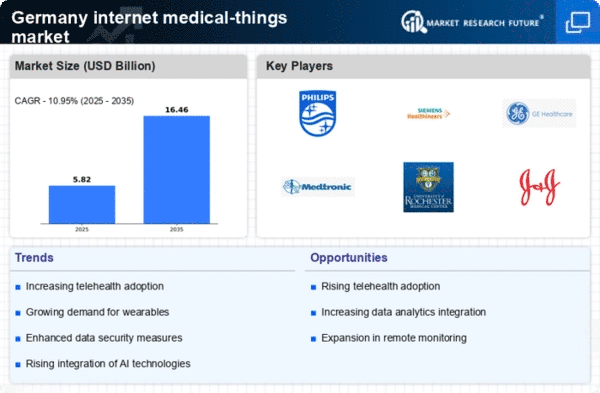Regulatory Support and Frameworks
The regulatory environment in Germany is evolving to support the internet medical-things market. The government is implementing frameworks that encourage innovation while ensuring patient safety and data protection. Initiatives such as the Digital Healthcare Act aim to promote the use of digital health applications and telemedicine services. This regulatory support is likely to enhance market growth, as it provides a clear pathway for companies to develop and deploy new technologies. In 2025, it is anticipated that the market will benefit from increased funding and incentives for startups focusing on digital health solutions. This supportive regulatory landscape is crucial for fostering a competitive environment in the internet medical-things market.
Technological Advancements in Healthcare
The internet medical-things market in Germany is experiencing a surge due to rapid technological advancements in healthcare. Innovations such as artificial intelligence, machine learning, and advanced data analytics are transforming patient care and operational efficiency. These technologies enable healthcare providers to offer personalized treatment plans and improve patient outcomes. In 2025, the market is projected to grow by approximately 15%, driven by the increasing adoption of smart medical devices and telemedicine solutions. Furthermore, the integration of Internet of Things (IoT) devices facilitates real-time monitoring of patients, which is crucial for chronic disease management. This trend indicates a shift towards more proactive healthcare, where data-driven insights play a pivotal role in decision-making processes within the internet medical-things market.
Increased Health Awareness Among Consumers
There is a notable increase in health awareness among consumers in Germany, which is positively impacting the internet medical-things market. As individuals become more proactive about their health, there is a growing demand for digital health solutions that facilitate self-monitoring and health management. This trend is evident in the rising popularity of health apps and wearable devices that track fitness and vital signs. By 2025, it is projected that the consumer health technology market will grow by 25%, driven by this heightened awareness. This shift in consumer behavior is likely to encourage healthcare providers to adopt innovative solutions, thereby enhancing the overall landscape of the internet medical-things market.
Growing Demand for Remote Patient Monitoring
The demand for remote patient monitoring solutions is significantly influencing the internet medical-things market in Germany. As healthcare systems seek to reduce costs and improve access to care, remote monitoring technologies are becoming essential. Patients with chronic conditions benefit from continuous monitoring, which can lead to timely interventions and reduced hospital admissions. In 2025, the market for remote monitoring devices is expected to expand by 20%, reflecting the increasing acceptance of these technologies among healthcare providers and patients alike. This trend underscores the importance of integrating remote monitoring solutions into the broader healthcare ecosystem, thereby enhancing the overall efficiency of the internet medical-things market.
Collaboration Between Tech Companies and Healthcare Providers
Collaboration between technology companies and healthcare providers is emerging as a key driver for the internet medical-things market in Germany. Partnerships are being formed to develop integrated solutions that combine medical expertise with cutting-edge technology. These collaborations facilitate the creation of innovative products that address specific healthcare challenges, such as patient engagement and data interoperability. In 2025, it is expected that such partnerships will lead to a 30% increase in the introduction of new digital health solutions. This collaborative approach not only enhances the capabilities of the internet medical-things market but also fosters a culture of innovation within the healthcare sector.
















